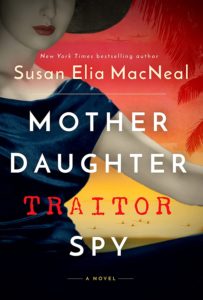 In her Maggie Hope series, Susan MacNeal has seemed to be more and more interested in the US side of the outbreak of WWII (see The Hollywood Spy, 2021). In this novel, a standalone, she pursues that interest, creating a terrifying account of Nazism in America in 1940. Her central characters, mother and daughter Vi and Veronica, kick off the action with Veronica’s graduation from Hunter College in New York. Veronica is looking forward to an internship at Mademoiselle magazine, but thanks to an unfortunate turn of events the internship is rescinded. She and her mother, along with her Pasadena based Uncle Walter (in town for her graduation from Hunter) make plans to move to California. Uncle Walter is willing to let the women live in his beach house.
In her Maggie Hope series, Susan MacNeal has seemed to be more and more interested in the US side of the outbreak of WWII (see The Hollywood Spy, 2021). In this novel, a standalone, she pursues that interest, creating a terrifying account of Nazism in America in 1940. Her central characters, mother and daughter Vi and Veronica, kick off the action with Veronica’s graduation from Hunter College in New York. Veronica is looking forward to an internship at Mademoiselle magazine, but thanks to an unfortunate turn of events the internship is rescinded. She and her mother, along with her Pasadena based Uncle Walter (in town for her graduation from Hunter) make plans to move to California. Uncle Walter is willing to let the women live in his beach house.
Uprooted and beginning life in a very new place, Veronica begins by looking for a journalism job, with no luck. A woman in a diner overhears her talking with her mother and tells her to ask a friend of hers for a typing job. Intrepid, she heads out to check out this job, where she is hired by the friendly McDonnells and put right to work. However, by the end of her first workday, she realizes the McDonnells, nice as they may be, are Nazis. She and her mother turn first to the police, then the FBI, and then, as a last resort, to an old Navy contact of her father’s.
That gets the ball rolling. Vi is a Navy widow, so she’s listened to and the women’s account is referred to two men working undercover and mostly unappreciated in LA (at the time, Hoover was more worried about Communists). When the men hear Veronica’s story, they ask if she will work undercover, using her journalism skills to observe and report back to them everything she hears in her work. Veronica agrees and it’s not long before her mother, who is an embroidery whiz, gets noticed by a fashionable woman who wants not only to commission some work but to introduce Vi to her friends.
The woman takes Vi to an “America First” lunch. This group, organized by Charles Lindbergh, was very much an isolationist group, wanting to keep the US out of another foreign war so soon after the last one. While Vi herself is an isolationist, she’s not an anti-Semite, and she’s horrified by what she hears at the luncheon. It’s not long before she, too, is working undercover.
MacNeal does an excellent job of illustrating the strain and tension of living a life that’s nothing like your own. Even though it’s for a very good cause, Veronica becomes more and more uncomfortable as she gets close to and begins dating one of the young Nazis she meets at the social club the McDonnells take her to. Because she looks “right” – i.e. Aryan, blonde, blue eyed, with a German background, and because she sits in the background taking shorthand, she’s pretty well overlooked. Not only is she sitting in meetings taking notes, she’s learning all kinds of things from her boyfriend, and she’s able to pass along quite a lot of information.
What’s truly unsettling about this book are the parallels to our present moment, with it’s threat of violence from groups that want to listen to only one voice. At times it was difficult to read. Of course, MacNeal’s story, set in 1940 and heading to 1941, is going to end in a decisive manner with the bombing of Pearl Harbor. The very human cost of the undercover work done by Veronica, Vi and their team is beautifully illuminated by MacNeal, who, as always, wears her writer’s heart on her sleeve. Heartbreaking and ultimately redemptive, the reader knows Veronica and Vi still have much to live through, but they’ve really done their part. This is a fascinating backstage look at history.